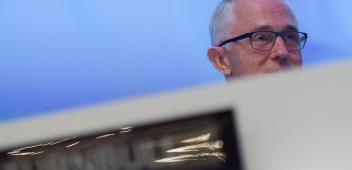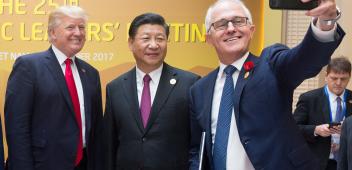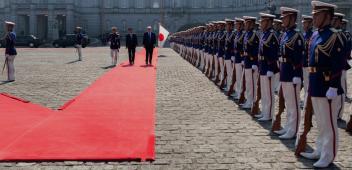Donald Trump's administration: It's not as good as it looks
Trump's dark vision of America's role in the world is worrying, even if he had the teams and political skills to pull it off, writes Michael Fullilove in the Australian Financial Review on 30 January. Photo: Getty Images/Bloomberg

In January 2009 nearly 2 million people assembled in Washington DC for the inauguration of Barack Obama. He gave an optimistic speech affirming America's role in the world.
Eight years later a significantly smaller crowd listened to his successor, Donald Trump, deliver a much darker speech. If the themes of Obama's inaugural address were hope and change, the themes of Trump's were fear and rage.
The 2017 inauguration, and the first days of the new administration, have put paid to the argument that President Trump will be notably different from candidate Trump. This is a man who has run his own business his whole life. He has just become the most powerful person in the world by ignoring the advice of experts. He is unlikely to change just because he won an election.
Earlier this month I visited Washington and New York to meet political players, editors and think-tankers. I encountered anxiety not only about Trump's personal style, but also about the likely character of his administration and the nature of his foreign policy.
What his administration looks like will depend largely on the role that Trump elects to play. Will he be a hands-off chairman of the board, delegating decisions and empowering his lieutenants, while he focuses on his own obsessions? Or will he be a hands-on chief executive, managing the government tightly and firing those who disagree with him?
Dishonesty
The former would be preferable but the latter seems much more likely, especially after the flurry of executive orders Trump signed in his first week. As one expert said to me, it would be unwise to underestimate the effect of Donald Trump on the Trump administration.
This White House looks less like a professional political operation than a mediaeval court with various barons and a crown prince and princess. There seems to be no one willing to remind the President that he is now in the White House, not Trump Tower.
It was shocking, for example, to watch the new press secretary Sean Spicer tell obvious untruths about the size of the inauguration crowd. Trump needs the word of the White House to be believed. It was madness to undermine the administration's credibility so early over such a trivial matter. Now we learn the President personally called the head of the National Park Service to complain about photographs of the crowd that he felt diminished its size. Bizarre as this is, it does not seem surprising.
Washington insiders hold out more hope for the agencies. Both the new Secretary of State Rex Tillerson and the Secretary of Defence James Mattis are impressive individuals with orthodox views on America's place in the world.
But will they get to shape US policy? Will Trump allow the tension between his views and theirs – so evident in their confirmation hearings – to continue, or will he move to resolve it? Trump is not known for his impulse control.
On Friday President Trump said he would allow General Mattis to 'override' him on the question of torture. But will this approach last? Will it survive a crisis?
And who will be working under these secretaries? We do not know who their deputies will be. The Trump administration has so far nominated just 31 officials for 690 positions requiring Senate confirmation. Only four have been confirmed.
No wonder a senior Republican said to me of the Trump administration, with a smile: 'it's not as good as it looks'.
Liberal order unbeliever
What of President Trump's foreign policy?
The problem for a country like Australia is that over many decades Trump has shown himself to be an unbeliever in the global liberal order.
He is hostile to free trade agreements – or at least those he did not negotiate himself. Indeed, on his first full day in office Trump signed an executive order withdrawing the United States from the Trans Pacific Partnership, thereby damaging America's economic prospects and undercutting its position in Asia.
But trade is only the beginning. Trump has always seemed sympathetic to isolationism, and he doubled down on this in his inaugural address, resurrecting the term 'America First' to describe his foreign policy. America First was, of course, an isolationist organisation in the 1940s dedicated to keeping the United States out of the war against the dictators.
In his first week in office he signed executive orders to build a wall along the country's southern border and cut funding to international organisations by at least 40 per cent. On Friday he drew back even further, suspending the entry of all refugees to the United States, barring Syrian refugees indefinitely, and blocking entry of citizens of seven Muslim-majority countries.
These are cruel, self-inflicted blows to the image of the United States as a generous superpower that is open to the world.
Trump is sceptical of alliances and attracted to strongmen, in particular Russia's president Vladimir Putin, a declared opponent of the liberal order.
From Russia with love
No one knows if Russian intelligence holds compromising information about Trump. But he certainly acts like they do. Over the past year he has been inconsistent on almost every issue except Russia.
It is not necessarily a bad thing for Trump to want to improve relations with Russia, indeed the last two presidents tried to do so. In both cases it came unstuck due to the huge gulf in interests between the United States and Russia. Bipartisan congressional support for continued US sanctions against Russia may complicate Trump's plans.
Trump's views on Asia are less well-developed. For example, it is hard to predict where the administration's China policy will end up. Clearly his starting position is to be tough on China – and it would be hard politically for him to be soft on both Moscow and Beijing. His zero-sum economic rhetoric on China continues. Both Tillerson and Spicer have warned that the United States will seek to deny China access to the artificial islands in the South China Sea.
But equally, one could imagine Trump cutting a deal with China in a few years' time, especially on security issues, if President Xi Jinping helps him on economic questions. Trump may come to see Xi as another strongman with whom he can do business. Does anyone really believe Trump cares about half-submerged water features in the South China Sea?
There is a third option open to President Trump, of course. He could establish a more assertive relationship with China while cooperating with Beijing where it is in US and Western interests. But this is a devilishly difficult balance to strike. Does anyone think this administration – which has appointed no Asianists of note – has the deftness of touch to pull it off?
And good for Australia
On the operational level, Australia's relations with Trump's Washington will probably be good. His administration includes a number of individuals friendly to us, including Mattis and national security adviser Mike Flynn. We may benefit from President Trump's stereotyped way of seeing the world. Judging from his warm press conference with British Prime Minister Theresa May, Trump likes the Anglosphere.
But this conceals the larger problem. Australia is a stakeholder in the liberal order and a player in Asia. The new President of our closest ally is suspicious of that order and untried in Asia.
The politics of the alliance are clearly changing in Australia. Lowy Institute polling last year revealed that nearly half of Australians wanted us to distance ourselves from the United States if someone like Trump were elected.
It would be short-sighted for Canberra to turn away from the United States. But that doesn't mean we should go along with President Trump's every whim. Rather, we should add our voices to those in Washington and other allied capitals who are counselling him in the direction of prudence.
I was part of that huge crowd on the National Mall in Washington in 2009. Before the proceedings began, I looked up to see a bald eagle – America's national symbol – soaring and swooping over the Capitol dome. I found this quite affecting and I pointed it out to the stranger next to me. She turned out to be a conservative Republican. She told me this was no heavenly sign, but a trained eagle that the Obama team had put up in the sky to attract positive media attention.
At the time, I found this world view merely disappointing. In retrospect I see it as disturbing. It was an early case of a new, more dangerous strain of partisanship in which many Americans are willing to ignore reality if it does not fit with their prejudices. Where I saw an eagle, she saw 'fake news' and 'alternative facts'. This is the world – President Trump's world – in which the United States and Australia must now make our way.



